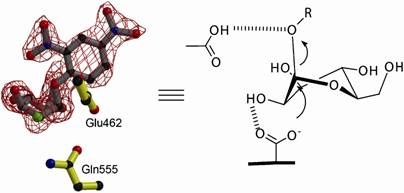NYU chemists discover twisted molecules that pick their targets
Advertisement
New York University chemists have discovered how to make molecules with a twist — the molecules fold in to twisted helical shapes that can accelerate selected chemical reactions. The research, reported in Proceedings of the National Academy of Sciences (PNAS), could yield valuable methods for making pharmaceuticals and other chemicals that require precise assembly of complex structures.
The NYU team performs studies in "biomimetic chemistry." This research pursues synthetic molecules with structures and functions resembling molecules found in nature. Many biological molecules, such as proteins and DNA, can fold themselves into ordered helices and bundles. Within the past decade, scientists have successfully synthesized molecular chains that can also fold into various shapes. Although these "foldamers" resemble biochemical forms, finding mimics of biochemical functions has been more elusive. Now, the NYU chemists are able to create folded molecules that can perform a complex function. In this case, the new molecules are catalysts — substances that speed up the rate of chemical transformations.
The PNAS paper describes how to embed a catalytic chemical group within a larger twisted architecture. The researchers' hypothesis was that the arrangement of the surrounding twist would help determine how contacts could be made between the catalyst and surrounding molecules. To test the functionality of their foldamer, they combined it with a pair of mirror-image molecules —those with identical composition, but whose atoms are distributed in opposing spatial locations, much like left-handed and right-handed gloves — to determine if it could correctly interact with one of the pair in order to form a new chemical. The ability of the foldamer to do so was evidence of its precision.
"Our molecules are particularly interesting in that they are 'selective'—they will recognize one type of target molecule and catalyze its chemical conversion," explained NYU Chemistry Professor Kent Kirshenbaum, one of the study's authors. "This is especially important for making complex chemical structures, so we think this may be eventually useful for the synthesis of new drugs."
Other news from the department science
Most read news
More news from our other portals
See the theme worlds for related content
Topic world Synthesis
Chemical synthesis is at the heart of modern chemistry and enables the targeted production of molecules with specific properties. By combining starting materials in defined reaction conditions, chemists can create a wide range of compounds, from simple molecules to complex active ingredients.

Topic world Synthesis
Chemical synthesis is at the heart of modern chemistry and enables the targeted production of molecules with specific properties. By combining starting materials in defined reaction conditions, chemists can create a wide range of compounds, from simple molecules to complex active ingredients.





























































